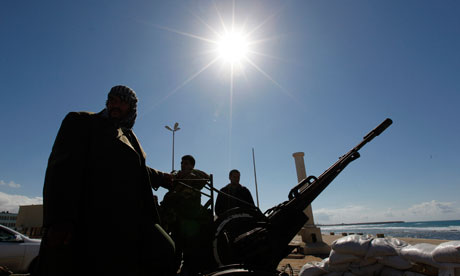What next for Libya, a divided land riven by bloodshed?
As Libya teeters on the brink of civil war Ian Black and Julian Borger examine the possible scenarios for the country

1 Divided country
It is possible the current situation could settle into a de facto division between a rump Libyan state around Tripoli and an eastern rebel movement that cannot take over the whole country.
Anti-Gaddafi forces now control Benghazi and much of eastern Libya up to the border with Egypt. The area is run by tribal elders, local people and senior figures who have defected from the regime. The rebels control the oilfields in Ras Lanuf and Brega.
Opposition forces also control Zawiyah, just 30 miles from Tripoli, although signs are imminent of a counter-offensive by the government. Misrata, an important Mediterranean port, east of the capital, is disputed and saw fighting again on Monday. Reports from Benghazi speak of concerns about food and medical supplies running low in a couple of weeks, although the port and the border with Egypt are open. The regime controls Tripoli, home to some 2 million of Libya's 6.5 million population, the international airport, the port and some outlying towns. It also controls Sirte, Gaddafi's home town, which opposition supporters have to skirt on a long detour south to avoid loyalist forces.
A further large area, as much as a third of the country in the south and areas around Tripoli, are effectively neutral and under the control of tribes. Sebha on the edge of the Sahara is a Gaddafi stronghold and was reportedly used to ferry in African mercenaries. It is hard to see opposition forces winning an outright military victory, not least because many tribes in western Libya have remained neutral.
2 Gaddafi: fight or flight?
Muammar Gaddafi has said he will die a martyr in Libya rather than flee abroad. Military experts estimate he can count on 10,000 to 12,000 troops, as well as the regime's security services and foreign mercenaries.
The air force is an important factor. But with UN sanctions banning him and his sons from foreign travel, his only escape would be to a friendly country that is already defying the international community, with Robert Mugabe's Zimbabwe the most likely candidate.
It was intriguing to hear a White House spokesman say explicitly that exile would be one option.
On the face of it, defiance to the end is likely to be Gaddafi's preferred option, though that is likely to mean far more bloodshed.
"The west are telling him to go, but to go where?" asked an Algerian analyst, Saad Djebbar. "Gaddafi needs a safe passage."
Could loyalist tribes persuade the leader to step down and guarantee him a peaceful retirement, like Hosni Mubarak in Egypt? Gaddafi's tribe, the Gaddadfa, is allied with the larger Megraha tribe. Both their interests are intimately tied in with the regime.
US and western policy is to quietly encourage more high-level defections from the regime and key elements of the military.
3 Military intervention
David Cameron told parliament that he had asked the defence ministry and armed services chiefs to work with allies on plans for a no-fly zone. Those talks have started in Washington over the past few days.
British officials caution that any such action would be taken only with "wide international support". That would mean a further meeting of the UN security council, which left the door open to stronger action in the resolution it passed. Russia and China have made it clear they are opposed in principle to any such action, but they would be under heavy pressure to relent if the Gaddafi regime committed an atrocity with mass casualties using warplanes or helicopters.
The UN could also be called on to provide blue-helmeted peacekeepers to ensure the delivery of food aid, perhaps along corridors through Tunisia and Egypt, if the humanitarian crisis develops as a result of the conflict.
British and German planes have already landed in the Libyan desert without the permission of Tripoli, so that barrier has been breached, and the French have announced they will fly two planes into Benghazi to deliver humanitarian supplies. The prime minister, François Fillon, described it as the start of "a massive operation of humanitarian support for the populations of liberated territories".
Possibly in anticipation of a future need to operate as a staging post for a multilateral military mission, Italy has suspended a two-year-old pact with the Gaddafi government that promised not to use "direct or indirect" military force against Libya, or allow Italian territory to be used "in any hostile act against Libya".
4 Power vacuum
There are concerns about a power vacuum developing if the regime is toppled or suddenly collapses. The Benghazi-based National Libyan Council, which insists it is not an interim government, is designed to fill that gap. But it is divided politically.
Two of its key leaders are high-level defectors from the regime: Abdel-Fatah Yunis al-Obeidi and Mustafa Abdel-Jalil were respectively Gaddafi's ministers of the interior and justice. Some analysts see a possible future unifying role for Abdel-Salam Jalloud, Gaddafi's former right-hand man, who is untainted by corruption. "Jalloud would be a steady pair of hands to steer the country through the troubled waters of the coming months," said Menas, a London-based consultancy.
Concerns also centre on the possibility of tribal rivalries intensifying and of al-Qaida militants taking advantage of a vacuum to regroup in a country where jihadis have been defeated.
The Quilliam Foundation thinktank said it was important for the international community to help Libyans create a national coalition. "Creating this coalition would also allow … the orderly supply of food and humanitarian relief, the systematic protection of the Libyan infrastructure against looting and the security of Libya's borders."
Libya watchers worry that the disparate opposition factions taking part in the fight against Gaddafi are not organised politically and lack a clear strategy for ousting him, said IHS Global Insight Perspective.
(source:the guardian.co.uk)
==============================================
No comments:
Post a Comment